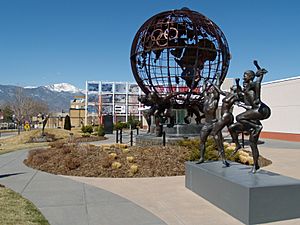Competition facts for kids
Competition is when two or more people or groups try to achieve the same goal, but only one can win. Think of it like a race where only one person can cross the finish line first. When one person gains something, another might lose out. This happens in many parts of life, like between animals, people, or even businesses.
In nature, animals compete for things they need to survive, like food, water, and mates. Humans also compete for basic needs, but often they compete for wealth, power, fame, or recognition. In business, companies compete to get customers. Inside a company, people might compete to improve services or products.
Even though competition can seem like the opposite of teamwork, they often happen together. For example, in a game of chess, players cooperate by following the rules, but they compete to win.
Many experts study competition, including psychologists, who look at why people compete and how it affects groups. Sociologists study how competition impacts society, and anthropologists look at how competition has changed throughout history and in different cultures.
Contents
Competition in Nature and Animals
Competition is a very important force in nature, especially in the study of how living things interact with their environment, called ecology.
Animals of the same species often compete with each other for resources like food, water, and territory. This is called intraspecific competition. For example, two deer might fight over the same patch of grass. This competition can lead to the strongest or best-suited animals surviving and having babies.
Competition also happens between different species. This is called interspecific competition. If there isn't enough food, different animal species might compete for it. The species that are not as good at competing might die out, or they might learn to adapt and find new ways to get resources. This competition is a big part of natural selection, which is how living things change over time.
Fun Consumer Competitions
Have you ever entered a contest to win a prize? In some countries, like Australia and the UK, these are called "competitions" or "lottos." In the United States, they are often called "sweepstakes."
These are usually free contests run by businesses to promote their products or services. For example, you might buy something and then get a chance to enter a drawing to win a prize. Many people enter, all hoping to win one of the limited prizes.
These contests can be based on luck, where winners are chosen randomly, or on skill, where you might have to answer a question or create something. Sometimes, they are a mix of both! People who love entering these contests are sometimes called "compers."
Why Do We Compete?
Many thinkers believe that most living things have a natural drive to compete. This trait, called competitiveness, helps organisms survive and adapt. In humans, competitiveness can sometimes be linked to being ambitious or aggressive.
In business, competitiveness measures how well a company can sell its products or services in a market. Governments often look at how competitive different industries are when making plans for the economy. Companies always try to stay competitive to do well.
Competition in Education
Competition plays a big role in schools. Around the world, education systems often encourage students to compete for things like scholarships. Some countries even have special programs for very smart students, which can lead to some schools being seen as better than others.
Students often compare their grades to see who is doing better. In some places, the pressure to do well can be very high. Some experts, like Alfie Kohn, argue that too much competition in schools can actually make students perform worse and make everyone feel like a "loser." Economist Richard Layard also said that always trying to do better than others can make people feel stressed and isn't a good way to build a society.
However, other studies show that competition can be good for some students. Students who are very motivated and willing to take risks often do well in competitive settings. They tend to be more flexible and creative as adults.
Competition in Business and Money
In business, competition means that two or more companies try to get customers by offering the best deals. When companies compete, they often create new products, services, and technologies. This gives customers more choices and better products, usually at lower prices. Without competition, one company might have a monopoly and charge very high prices.
But competition can also have downsides. Sometimes, companies might waste effort by doing the same things, or it could lead to higher costs. For example, many aspiring musicians and actors spend a lot of money on training, but only a few become successful because the competition for top jobs is so intense.
Some experts also say that focusing too much on beating rivals can lead to "price wars," where companies keep lowering prices, which can hurt their profits.
There are different types of competition in business:
- Direct competition: This is when products that do the exact same thing compete. For example, one brand of pickup truck competes with other brands of pickup trucks.
- Indirect competition: This is when products that are similar or can be used in place of each other compete. For example, butter competes with margarine.
- Budget competition: This is the broadest type, where anything a customer might spend their money on competes. For example, a family might choose to spend money on a new car or a vacation. Both are competing for the family's money.
Companies also compete to get money from investors to run their businesses. Investors look for the best places to put their money.
Sometimes, companies even have internal competition. This means different parts or brands within the same company compete with each other. For example, at General Motors in the past, the Chevrolet division competed with the Pontiac division for some customers. This helped them share parts and ideas. Many businesses also encourage competition between employees, like sales contests, to motivate them.
Competition in business is often regulated by laws to make sure it's fair. Governments might have rules to prevent monopolies or to stop companies from working together to fix prices.
Competition Between Countries
Countries also compete with each other, especially in the world economy. They try to create the best environment for large international companies to do business. For example, countries like Singapore and Japan invest a lot in education to prepare their future workers, hoping to attract businesses.
Competition and the Law
Laws about competition, called antitrust laws in the United States, have a few main jobs:
- They stop companies from making agreements to limit fair trade, like a group of shops agreeing to sell football jerseys at a higher price.
- They can prevent a company that controls most of the market from acting unfairly. For example, a software company with a monopoly shouldn't force users to use its own media player.
- They watch over big company mergers and acquisitions to make sure they don't harm competition.
These laws aim to protect customers by making sure businesses have to compete for their business.
Game Theory: The Science of Competition
Game theory is a special part of mathematics that studies how people or groups make decisions when they are in conflict or cooperation. It's used in many fields like economics, politics, and psychology.
It often looks at "zero-sum games," where if one person wins, another person loses. Game theory helps to understand how people will act when they are competing. It looks for the best strategies players can use, assuming they act logically. A famous idea is the "Nash equilibrium," where no player can do better by changing their strategy if everyone else keeps theirs the same.
Competition in Literature
Literary competitions are contests sponsored by magazines, publishers, and theaters. They are a way for new writers to get noticed and gain recognition for their work. Many awards exist for different types of writing, like fiction or plays.
Competition in Politics
Competition is also a big part of politics. In countries with democracies, elections are a form of competition where different candidates try to win a public office. The winner gets the position for a certain time, and then another election is held.
Inside a government, different departments might compete for limited resources, like funding. Also, leaders from different political parties often compete over laws, funding, and power.
Countries also compete with each other on a global scale. They might compete for influence, power, or military strength. For example, during the Cold War, the United States and the Soviet Union competed for world power and over their different types of government. This kind of competition can sometimes lead to global tensions or even wars.
Competition in Sports
Most sports and games are competitive. They usually involve two or more people or teams competing against each other. For example, in basketball, two teams compete to score the most points. Even if there's no prize, players often feel proud when they win.
In sports like gymnastics or diving, athletes compete to get the closest to a perfect performance, judged by specific rules and scores. Sports competitions are usually divided into:
- Individual sports: like archery.
- Dual sports: like doubles tennis.
- Team sports: like cricket or football.
While many sports are for fun, there are also professional sports leagues around the world. The Olympic Games, held every four years, are seen as the biggest international sports competition.
What Happens Because of Competition?
Competition can have both good and bad effects. Many scientists believe that competition between and within species helps living things adapt and evolve over time.
In a positive way, competition can be a fun activity or a challenge, as long as it's not harmful. On the negative side, competition can cause harm or waste resources and energy. In humans, intense competition can lead to stress, long work hours, and unhealthy relationships, even if it brings financial gain.
See also
 In Spanish: Competición (general) para niños
In Spanish: Competición (general) para niños
- Asymmetric competition
- Biological interaction
- Competition regulator
- Competitor analysis
- Conflict of interest
- Cooperation
- Ecological model of competition
- Monopolistic competition
- Non-zero-sum game
- Planned economy
- Prisoner's dilemma
- Sharing
- Student competitions
- Win-win game
- Zero-profit condition
- Zero-sum
 | Bayard Rustin |
 | Jeannette Carter |
 | Jeremiah A. Brown |



